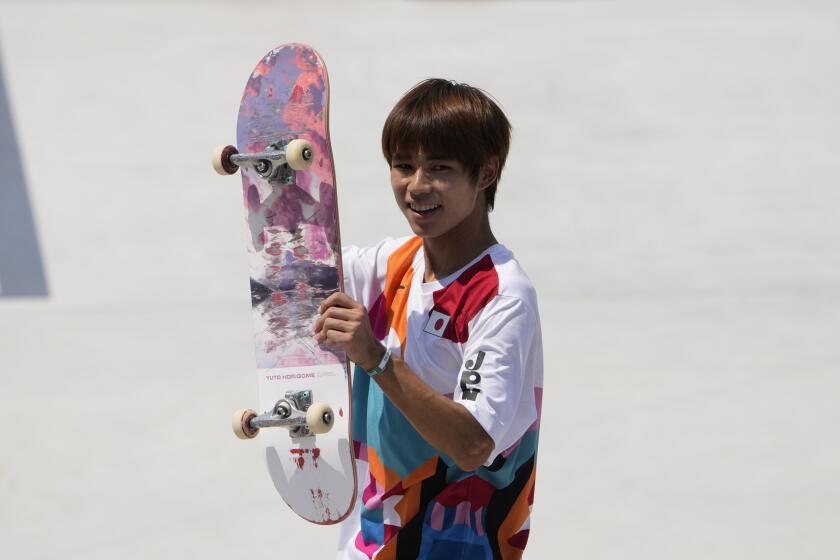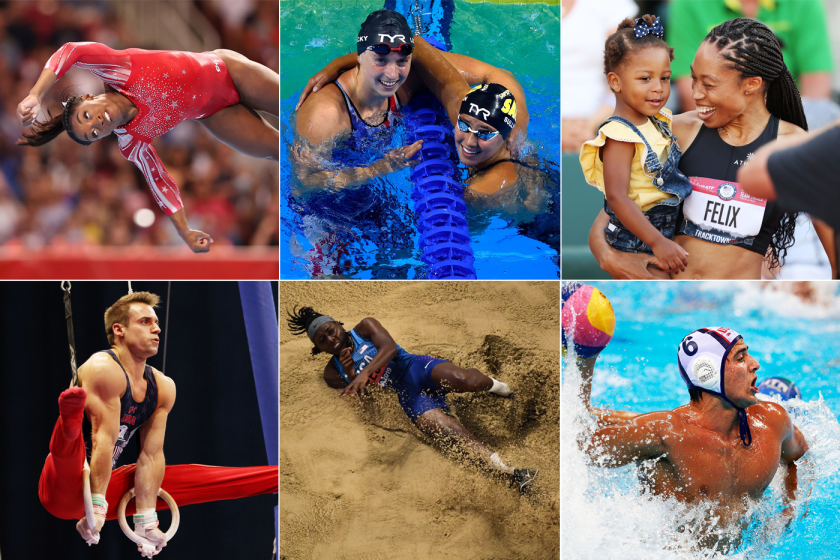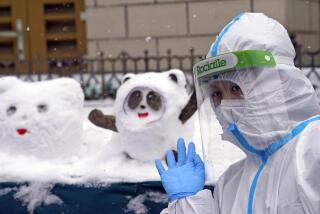How Tokyo Olympic athletes deal with the loud sounds of silence
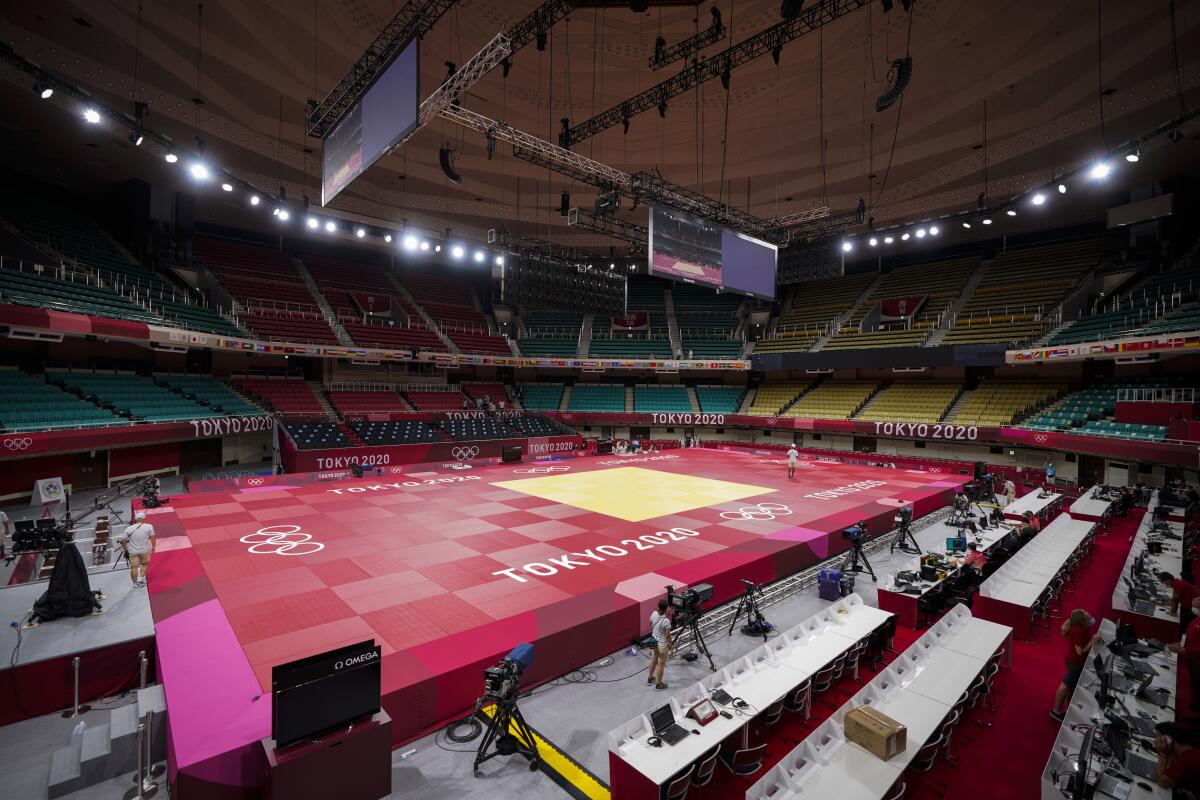
- Share via
TOKYO — The gray, bustling city gives way to a wooded park, green and alive with the whir of cicadas, an unexpected oasis amid tall buildings. Deep in the trees, hidden at first, sits a small arena, its entrance marked by ornate Japanese characters.
Revered as something of a mecca, the Nippon Budokan is a gathering place for Japan’s beloved martial arts. But if this building with its gently curved roof has the ambience of a temple, the pandemic has rendered it a little too respectful.
As the Summer Games began this past weekend, there was no roar of an approving crowd for the opening day of judo competition. Spectators had been banned as a health precaution, leaving only rows of empty seats, the echoed shouts of coaches and clapping teammates.
Jagger Eaton finishes with bronze in men’s street skateboarding, but Nyjah Huston, one of the favorites for gold, finishes seventh.
“Well, of course, the Olympic Games without spectators is a little bit uncomfortable,” said Yung Wei Yang, a Taiwanese judoka. “We are used to the noise, to noisy stands.”
Save for a few events in outlying prefectures, the Tokyo Games will proceed in empty stadiums and arenas, athletes performing to the sound of silence. Though most are glad for a chance to compete under any circumstances during the pandemic, they cannot help but feel that something is missing.
Two weeks ago, tennis star Novak Djokovic won Wimbledon before a boisterous center court. There will be no such uproar from 20,000 vacant seats at a brand-new stadium in the Ariake district.
“I feed from the energy from the crowd, negative or positive,” Djokovic said upon arriving in Japan to represent Serbia. “It’s one of the biggest reasons I keep playing.”
After COVID-19 forced the Games to be postponed in early 2020, local organizers, who expected to earn $800 million from ticket sales, pushed back against the idea of barring fans. This hardline stance began to soften as coronavirus cases surged and the government declared a state of emergency throughout much of the country.
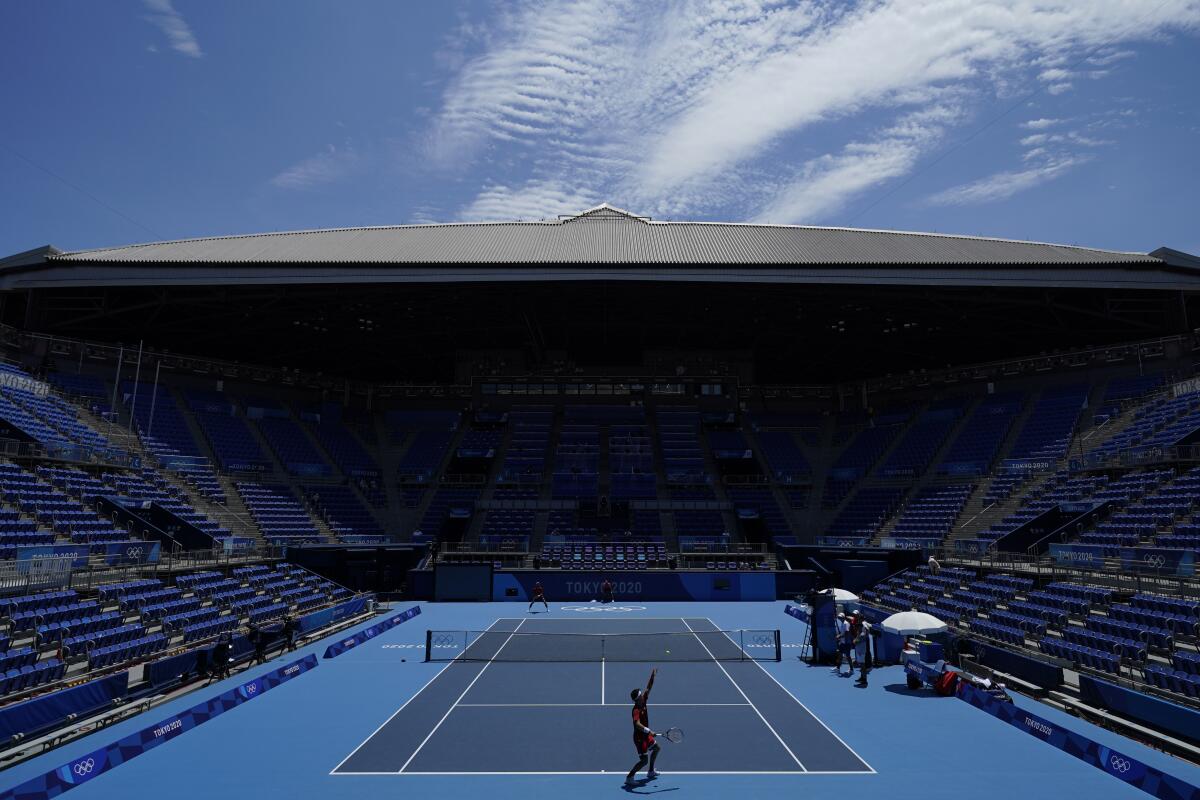
In March, the Tokyo 2020 organizing committee decided not to allow foreign spectators. A complete ban was announced in early July, just weeks before the opening ceremony.
“Taking into consideration the impact of the Delta strain and in order to prevent the resurgence of infections from spreading across the country, we need to step up virus prevention measures,” Prime Minister Yoshihide Suga told reporters.
Never before had the Games been played to no audience; if it was unclear what this might look and feel like, the last few days have provided clarification.
Has there ever been an Olympics where the sound of swimmers’ arms churning through water carried into stands? After U.S. softball pitcher Cat Osterman induced an inning-ending groundout at Yokohama Stadium — a sleek ballpark near the water in that city — a teammate could be heard saying, “Good job,” as they jogged off the field.
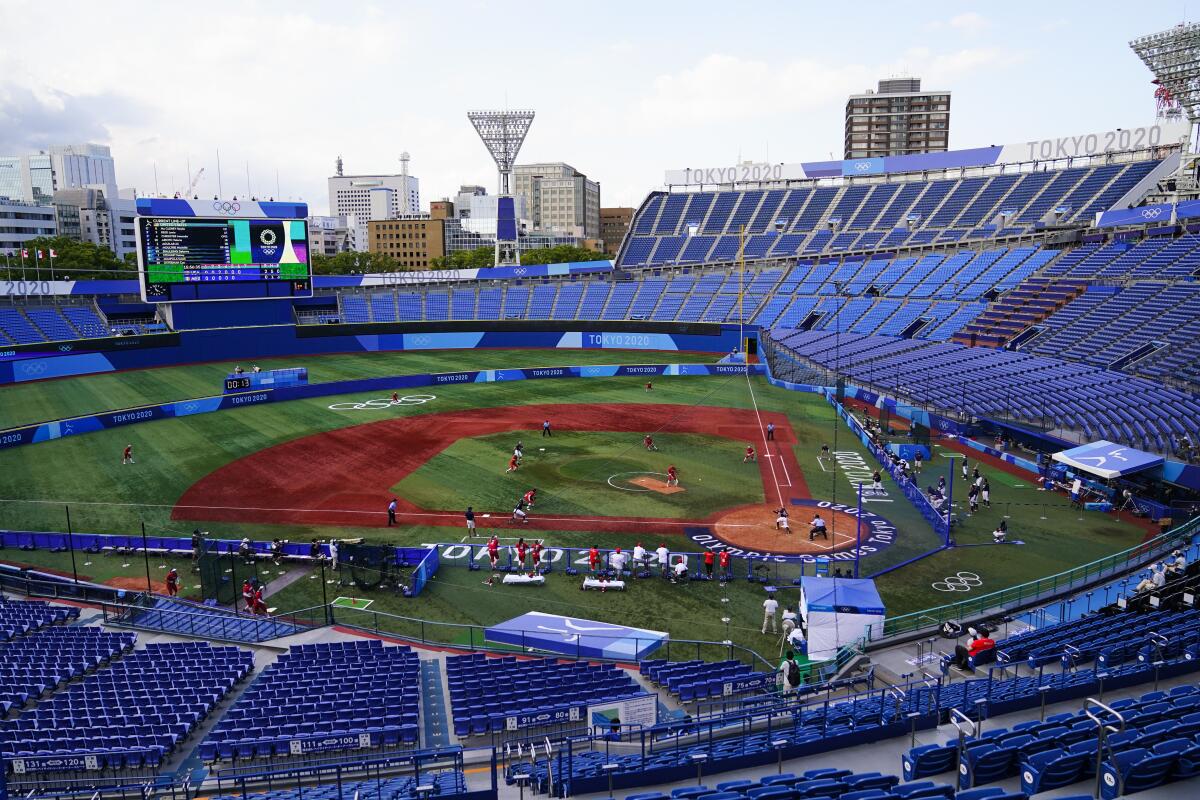
At Ariake Gymnastics Center, none of the usual cheering greeted Sam Mikulak’s perfect landing off the parallel bars. Teammate Shane Wiskus thought the lack of a crowd took some edge off.
“It just felt a little more homey,” he said. “Like another day at the gym.”
And when Sweden scored against the U.S. in a soccer match at Tokyo Stadium, the place was so quiet that the signature cry from Telemundo commentator Andres Cantor — “Goooaaall!” — could be heard from far away.
Empty stadiums are not entirely new. As sports returned after the coronavirus shutdown, many national and international competitions enforced spectator bans at first. But in numerous countries around the world, fans returned as restrictions eased. Even in Japan, professional baseball and sumo wrestling have reopened their doors.
With the Summer Games playing it more cautiously, athletes have been left to compensate by cheering for their teammates from the sidelines. American swimmers organized chants and banged inflatable, blue-and-red thunder sticks to make noise. At outdoor venues, the cicadas have pitched in with their buzzing melody.
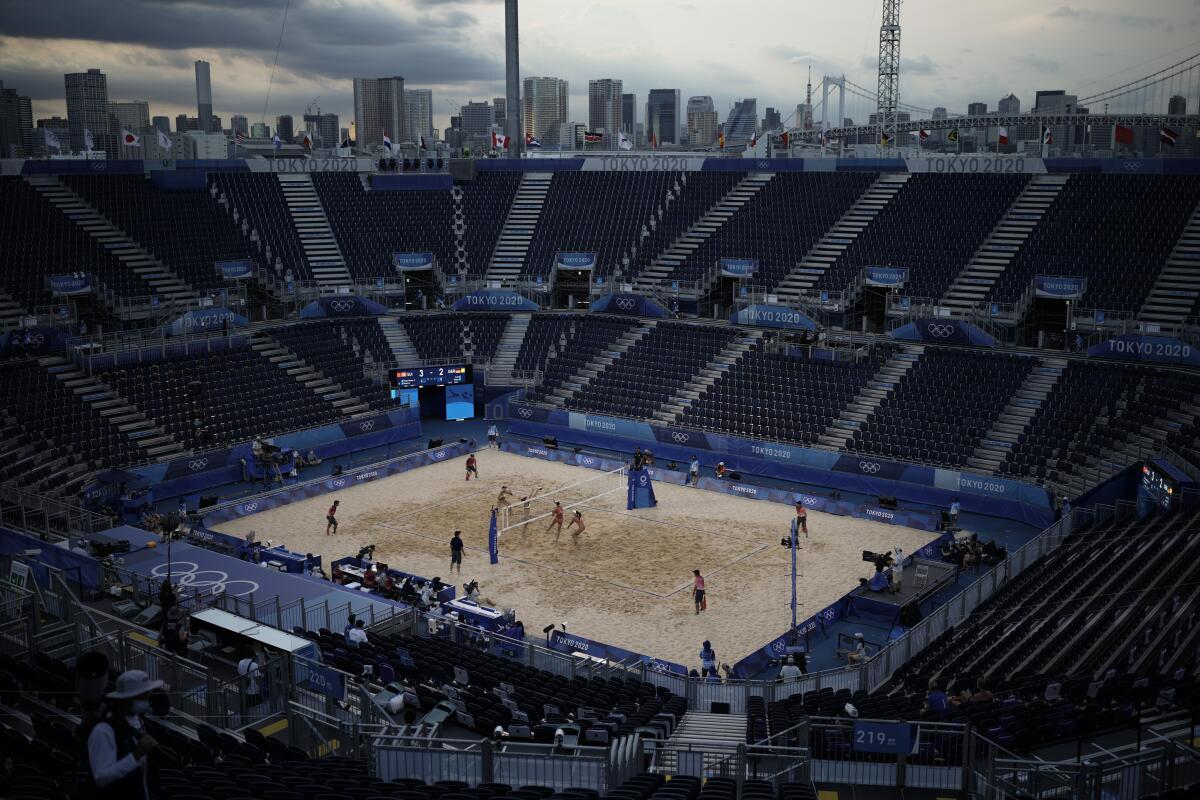
The International Olympic Committee is providing artificial help, having gathered audio of crowd noise and ambient sound from previous Games. These recordings are being aired over the public-address system at low levels, just enough to quell the echo of footsteps.
DJ Roueche, who normally works Laker games, has provided a musical soundtrack for beach volleyball matches and pop tunes have played between innings at baseball. Soccer players noticed “USA-USA” chants in the background.
“I think there was crowd noise,” U.S. star Megan Rapinoe said. “I was like, ‘Is that a fan? Or natural?’ That part sucks, obviously.”
On the pool deck, swimmers found that nothing could replace the real thing. Sarah Sjostrom of Sweden said: “It’s more exciting when you go up on the blocks with the crowd. You can’t compare anything with that.”
Even the visuals could be disconcerting.
Spotlights swirled across empty seats at several indoor venues. Workers scurried through deserted bleachers to retrieve foul balls.
The circumstances have hit Japanese athletes the hardest. They did not receive a welcoming blast of cheers as they entered Olympic Stadium for the opening ceremony. There has been no hometown crowd with whom to celebrate victories.
“We wanted to show gratitude to those fans who have supported us,” softball pitcher Yukiko Ueno said after leading Japan to an 8-1 win over Australia at Fukushima Azuma Stadium. “It’s definitely sad that they won’t be in attendance.”
Local organizers and the IOC still hope that spectator restrictions can be loosened over the next couple of weeks. Officials could convene a meeting with government leaders and public health experts to make changes at a moment’s notice.
But anything substantive would require a dip in Tokyo’s infection rate; as of the weekend, new cases were still trending above 1,000 a day.
“We would love to have fans if it was safe but it is clearly not,” Rapinoe said. “We understand how lucky we are to even have this and hopefully bring a little joy and entertainment to everyone watching around the world.”
The Tokyo Olympic Games will feature 613 American athletes vying for gold, with more than 80 hailing from cities and towns in Southern California.
On the first day of the judo competition, Naohisa Takato of Japan found a way to embrace the quiet around him, discovering something reverential in an unusual day leading up to the gold-medal match.
“In the middle of the Nippon Budokan, we were two players,” he said. “We can listen to each other’s breath.”
After defeating Yang in the final, Takato fell to his knees beside the bright yellow mat.
“Surrounding cheers were not there,” he said. “However, it was very quiet and serene and we were able to admire each other. That was a great experience.”
Staff writers Kevin Baxter, Ben Bolch, Helene Elliott, Nathan Fenno, Gary Klein and Dan Woike contributed to this story.
More to Read
Go beyond the scoreboard
Get the latest on L.A.'s teams in the daily Sports Report newsletter.
You may occasionally receive promotional content from the Los Angeles Times.

